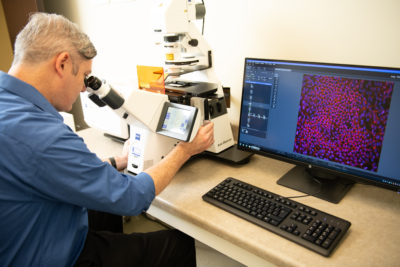Discovering New Therapies for AMD
The Molecular Ophthalmology Laboratory, under the direction of Dr. Karl Csaky, Managing & Medical Director at the Retina Foundation of the Southwest, is studying live cell cultures to investigate new potential drug treatments for age-related macular degeneration (AMD). Live cultures offer a quick and scalable solution for testing new drugs and therapies for AMD. Here, Dr. Catchpole and Dr. Kularatne, examine the growth of retinal pigment epithelial cells using an EVOS XL microscope. Using these retinal cells ensures that we develop a system in the culture dish that reflects the disease state.
For a closer look at the cells, we utilize the technique of immunofluorescence. This process allows us to tag specific parts of the cells with fluorescent markers. These tags can then be analyzed with the confocal microscope installed in the lab. Here, Dr. Catchpole analyzes the expression of Zo-1, a protein expressed in the boundaries between the retinal cells. The use of these fluorescent markers allows us to analyze the changes occurring in the retinal cells in AMD at a molecular level. Our goal is to discover the best possible drug treatment for damaged retinal cells, and potential new therapies to treat AMD.

Related Articles
Age-Related Macular Degeneration Happenings at the Foundation New Technology Gives ‘Second Sight’ to the Blind COVID-19 Guidelines For Retina Foundation Staff and Visitors Investigating the Impact of Lazy Eye on Reading Speed and Motor Skills in Children – Video Update Retina Foundation Presents at Largest Retina Meeting in China
